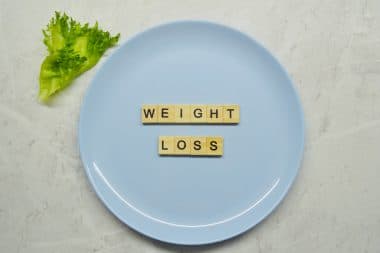We’ve all heard of yo-yo dieting: a cycle of experimenting with a new diet to lose weight quickly, gaining the weight back just as quickly, then starting all over again with a new diet. While the ups and downs of yo-yo dieting can be frustrating – demoralizing, even – that’s not the end of the story. It’s also been shown to negatively affect your body in a number of ways.
When researchers at Columbia University surveyed 485 women about their records of weight loss and regain, they found the more frequently a woman’s weight fluctuates, the lower her score on the American Heart Association’s Life’s Simple 7 index. While losing weight may be a healthy endeavor, the benefits are negated when the weight loss is short-term. In fact, losing and gaining weight quickly can even elevate the risk of heart disease and Type 2 diabetes.
The takeaway here is not that losing weight is unhealthy but that yo-yo dieting is the problem. Yo-yo diets tend to be built on fads, very few of which involve making lasting, healthy lifestyle changes. If weight loss is your goal, it’s prudent to approach any fad diet with a side of healthy skepticism.
Why Fad Diets Don’t Work
Fad diets are generally designed to help you shed weight quickly. Whether they’re promoted by celebrities or bestselling diet books, fad diets tend to gain popularity because they promise fast and easy weight loss. But what they don’t offer are a sustainable lifestyle that promotes long-term health.
The methods outlined in most fad weight-loss plans are extreme – you consume dangerously few calories or eliminate entire categories of essential nutrients – and the results aren’t real. For example, say you go on a seven-day juice cleanse: you may drop a few pounds according to the scale, but what you’ve really lost is water weight. Those pounds will come right back once you start eating normally. And during the so-called cleanse, you’re denying your body crucial nutrients like iron, protein, and calcium. Not to mention that once you resume eating solid food, your digestive system will have to relearn how to break it down. This can lead to bloating, indigestion, and increased fat storage.
In reality, fad diets are just not sustainable. You’ll either get so hungry that you break the diet, or your body will rebel and leave you with short-term or zero results. Without the results, you end up quitting the diet altogether and gaining the weight back, sometimes even more than you lost. What’s more, those major fluctuations on the scale can actually make your body less efficient at losing weight. Then it’s right back to searching for another quick weight-loss fix.
The Dangers of Yo-Yo Dieting
Not only can yo-yo dieting affect you physically, but it can also greatly impact your lifestyle and mental health. Psychologically, your weight becomes more than just a number on the scale. It comes to represent arriving at the door of success, followed quickly by that door being slammed in your face by what feels like a crushing failure. Instead of building a healthy habit, you’re caught up in a cycle of short-term victory and defeat. Studies have shown that this pattern can lead to lower life satisfaction, in turn causing episodes of binge eating.
If you’ve dieted in the past, you’ve probably experienced firsthand the links between yo-yo dieting and binge eating. But it’s not because of a moral failure or lack of willpower on your part. It’s because most fad diets require a huge change in your eating habits. This change may prevent you from eating the foods you normally enjoy, or it may leave you unprepared in terms of types and volume of foods required by the diet.
There’s also diet-induced deprivation, which can lead to unhealthy bouts of physical hunger and stress. Now you’ve thrown the hormones that regulate hunger and weight out of whack. This may also affect your body’s release of leptin, a hormone that signals satiety. If you don’t know you’re full, you may experience “phantom hunger.” As a result, you end up not only eating more than the diet requires, but more than your body even needs.
How to Stop the Cycle
There are ways to get healthy and lean without hurting our bodies. Here’s how to get started down the path to a long-term lifestyle change:
- Set Realistic Expectations
As tough as it may be, you can begin breaking the yo-yo dieting cycle by setting realistic goals. Trying to lose 10 pounds in three days will wreak havoc on your mind and body. Focus on making long-term healthy changes. Diets promising you’ll lose 10 to 20 pounds in two weeks do not count as “realistic.” Think about this: One pound of fat is roughly 3,500 calories. That means in two weeks, you’d need to burn 35,000 to 70,000 calories more than you consume.
For most people – when you factor in height, weight, age, and activity level, among other considerations – this is not a healthy goal. The rigor, restriction, and extreme deprivation needed to keep this pace can take a serious mental and physical toll. Studies show that a steady, gradual pace of losing one to two pounds per week is not only far more effective for long-term weight loss, but it’s also much more gentle on your heart.
- Understand Your Food Triggers
Take stock of the feelings and situations that make you turn to food. Do you tend to eat more when it’s late at night? When your energy is low? When faced with tedious tasks or emotionally stressful situations?
Get to the root cause of what leads you to mindlessly eat. Once you understand this, you can choose the foods and times you eat for fuel rather than emotional support. It will also help you to wean yourself off diet dependence and allow you to develop a healthy relationship with food.
- Replace Instead of Eliminate
You want very few things more than the thing you can’t have. Going on an extremely restrictive diet that forbids certain foods kicks off a downward spiral. It starts with obsessing over the “forbidden” foods, which leads to overindulgence, weight gain, and then diet after diet to reverse the effects of your perceived failure.
Instead of eliminating certain foods from your diet, look for healthier alternatives that deliver the same kind of satisfaction without the heavy calorie, sugar, salt, or saturated fat price tag. For example, sub your potato chips with kale or seaweed chips, or opt for frozen fruits instead of frozen ice cream. Trying new foods can be exciting and fun, making a health journey enjoyable instead of dread-inducing.
- Modify Your ‘Healthy-to-Decadent’ Ratio
Many of us have a feast-or-famine mindset that leads us to swing between overindulging and severely restricting what we eat. Focusing instead on balancing your indulgences with a pattern of healthy eating can break that destructive pattern. That could mean eating clean 80% of the time and giving yourself permission to enjoy “fun” foods the other 20%. Just be careful to avoid any foods or beverages that cause you to binge or overindulge past the minimum amount.
Making sustainable adjustments to your lifestyle may not seem as exciting as a juice cleanse or three-day diet, but it will let you lose weight and keep it off. Save the roller coaster rides for the amusement park and take your body and mind on a steadily paced journey toward health.
Leanna Olbinsky serves as the community manager for Sworkit, a premium digital health and fitness company that provides workouts, customizable plans, and resources that allow people to adopt and maintain healthy habits for life. She is dedicated to helping create the most supportive global health and fitness community for people who are working to make fitness a habit.








Reply